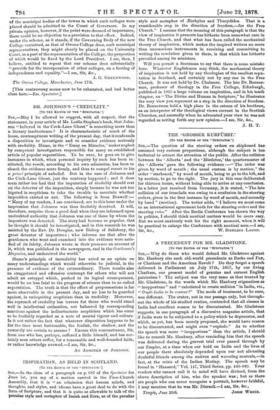DR. JOHNSON'S " CREDULITY."
[TO THE EDITOR' OF THE " SPECTATOR."] Six,—May I be allowed to suggest, with all respect, that the statement, in your article of Mr. Leslie Stephen's book, that John- son "believed in the Cock-Lane Ghost" is something more than a literary inadvertence ? It is chararacteristic of much of the loose, contemptuous writing of the present day, that it confounds a disposition to investigate and to consider evidence seriously with credulity. Hume, in the " Essay on Miracles," makes neglect by competent investigators responsible for many an established article of popular superstition. To be sure, he goes on to give instances in which, when personal inquiry by such has been in- stituted, the result, according to his own admission, has been to clench the evidence more firmly, and thus to compel resort to his a priori principle of unbelief. But in the case of Johnson and the Cock-Lane Ghost, just the contrary happened ; and it does seem rather too bad that the imputation of credulity should rest on the detector of the imposition, simply because he was not too bigoted in scepticism to take the trouble to ascertain whether imposition existed or not. The following is from Boswell :- "Many of my readers, I am convinced, are to this hour under the impression that Johnson was thus foolishly deceived. It will, therefore, surprise them a good deal when they are informed upon undoubted authority that Johnson was one of those by whom the imposture was detected. The .story had become so popular, that he thought it should be investigated, and in this research he was assisted by the Rev. Dr. Douglas, now Bishop of Salisbury, the great detector of impostures ; who informs me that after the gentlemen who went and examined into the evidence were satis- fied of its falsity, Johnson wrote in their presence an account of it, which was published in the newspapers, and in the Gentleman's Magazine, and undeceived the world."
Hume's principle of incredulity has acted as an opiate on many understandings which would otherwise be judicial, in the presence of evidence of the extraordinary. There results also an exaggerated and offensive contempt for others who will not admit an estoppel which, pushed to its logical consequences, would be no lees fatal to the progress of science than to so-called superstition. The truth is that the effect of prepossessions is far more observable in the present day, and no less to be guarded against, in uninquiring scepticism than in credulity. Moreover, the reproach of credulity has terrors for those who would stand well in intellectual estimation, not balanced by corresponding sanctions against the indiscriminate scepticism which has come to be foolishly regarded as a note of mental vigour and culture. Is it not rather the fact that whatever disposition happens to be for the time most fashionable, the foolish, the shallow, and the cowardly are certain to assume ? Excuse this remonstrance, Sir, from one who has, perhaps, suffered a little himself, and has cer- tainly seen others suffer, for a reasonable and well-founded faith, or rather knowledge avowed.—I am, Sir, &c.,
AN ADMIRER OF JOHNSON.


































 Previous page
Previous page